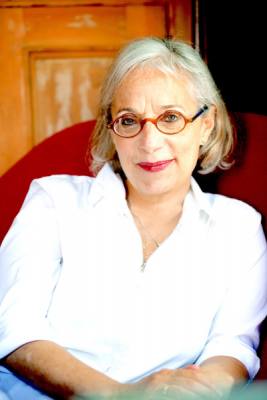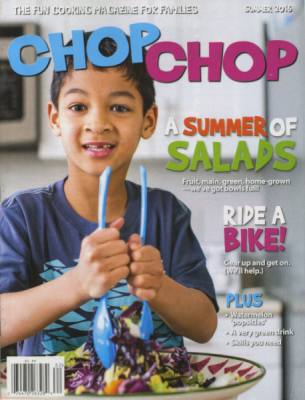
Sally Sampson is the founder and president of ChopChop magazine.
On her motivation behind ChopChop magazine: My career experience has been as a cookbook writer and a magazine contributor. I wrote different cookbooks and I contributed to a lot of different food magazines and other magazines. And I also had a child with a chronic illness. She needed to be on a very, very low-fat diet, so as a result I learned a lot about obesity. I began to feel that writing cookbooks wasn’t what I wanted to keep doing. I wanted to give back in some way. And I thought that I could use my skills as a cookbook writer to help address obesity by getting doctors to prescribe cooking during well-child visits. So, I don’t know if you have children, but it’s now mandated that you take your kids at certain times and that doctor’s talk about healthy eating and physical activity during these appointments.
On expanding the mission: We’ve expanded the mission to obesity, poor nutrition and hunger. Unfortunately, that covers a huge portion of the population. Poor nutrition is an obesity effect, rich and poor, and hunger affects the poor and we’re focused in our brains on those most at risk, but ChopChop is written to appeal to any children. We hope that the Whole Foods moms pay for it and the SNAP (Supplemental Nutrition Assistance Program) food moms get it for free through their SNAP program.
On whether she sees the niche market of children’s food magazines as growing: Well, it’s definitely grown. We’ve quadrupled in volume since our first year. And we have a bit of a strange business model. We’re a non-profit and we don’t take any ads. So, it really is 39 pages of content. There is one page where we have sponsors.
On any stumbling blocks that she’s had to overcome: If you asked my staff if we had stumbling blocks, they would say yes more than I would. I’m just the sort of person who puts one foot in front of the other and I don’t worry too much. Having had a chronically ill child, I don’t worry too much about anything other than my children being sick.
On the most pleasant moment she’s had throughout this magazine journey: We went to the White House and we interviewed Mrs. Obama; we did sort of a shared 5th anniversary of “Let’s Move” and ChopChop. We both launched within a month of each other and that was really incredible. We brought two kids to the White House and they interviewed her and she was amazing; she gave us way more time than she said she would. She was beyond charming with the kids. That was an amazing experience. We also won the James Beard Award, which was also incredible. So, those things are not insignificant, but I would say that the letters that we get from kids are just really moving and very real.
On whether anyone has ever told her she was out of her mind for launching a print magazine in a digital age: Oh yes, all of the time. Of course, the people who ask us if we’re out of our minds are not our readers. I think for a child to get this beautiful four-color thing that they can hold and touch, where they see a child who looks like them is important. We show kids of every color, adorable, braces, in wheelchairs; we just featured a child with Down Syndrome. We show real kids, and we don’t put makeup on them; we don’t tell them to smile. So, your grandchildren, and I don’t have grandchildren yet, but my grandchildren someday; the idea is that any child should be able to open the magazine and feel like they can relate.
On the myth that digital natives do not want anything to do with print: I honestly could not begin to understand why people feel that way. I still read paper books and I love magazines. I just think that there is something really special about print. I have an iPad and I read The New York Times on it; I read little things on it. But I think there is no sensuality to digital. Touching and feeling the paper is amazing. And I think for a child, for the magazine to be theirs, is pretty incredible.
On why she thinks it took the magazine industry so long to discover that print is not dead: I think it’s human nature and that people just have a tendency to go to extremes. First it was: no, you can’t eat any fat. Now you can eat fat. It must be the nature of human beings. I don’t know. I never felt like paper was dead and as you said in the beginning, we launched when people thought we were nuts. We launched within a very short time of Gourmet closing. Everybody asked why we were doing paper? But it just seemed like the right thing to do.
On whether she feels now that ChopChop is a movement rather than just a magazine: I do. If you think about it, we’ve got the cooking club; we have the curriculum; we’re not just a magazine. And also, when I started, not only did people ask was I crazy for doing print, but they also asked are you crazy; kid’s cooking? Like, who cares? But you look at it now and everybody sees kid’s cooking as a pipeline to many different things, whether it’s teaching kids about math or teaching them manners or teaching them to be responsible for themselves; really cooking is everything. There’s nothing that you can’t learn in a kitchen.
On what she would say if this interview were conducted one year from now: I would tell you that we launched a third magazine called “Seasoned.” And that magazine is for older adults. And you would say to me, but you’re focused on kids, and I would say to you, we’re focused on people who need help in the kitchen. “Seasoned” is launching in February, 2017. The AARP Foundation gave us a grant and I believe we’re actually launching in Mississippi as one of four southern states. It’s a smaller magazine and it’s for adults who need to cook from scratch instead of buying junk, and who are downsizing.
On what someone would find her doing if they showed up unexpectedly one evening at her home: I cook a ton. This sounds crazy, but whenever I’m emptying my dishwasher, I’m sort of amazed at how much I cook. I cook all of the time. I don’t eat anything prepared; I make every single thing from scratch.
On what keeps her up at night: Not ChopChop. The direction of the country keeps me up at night, or if my children are having a problem, that concerns me, even though they’re in their 20s. That’s the sort of thing that keeps me up at night.








